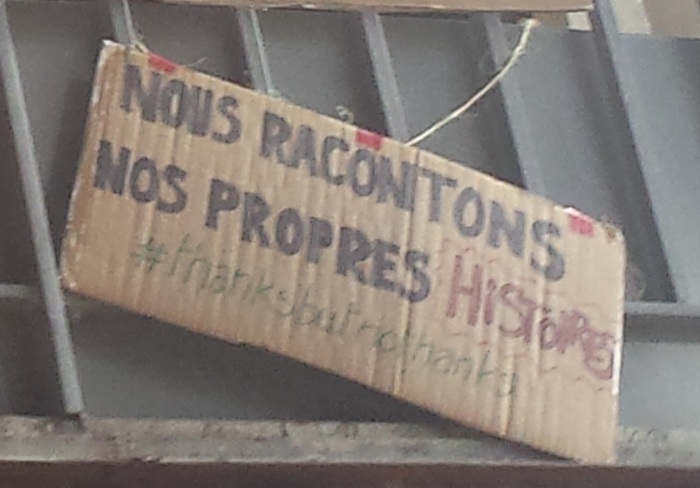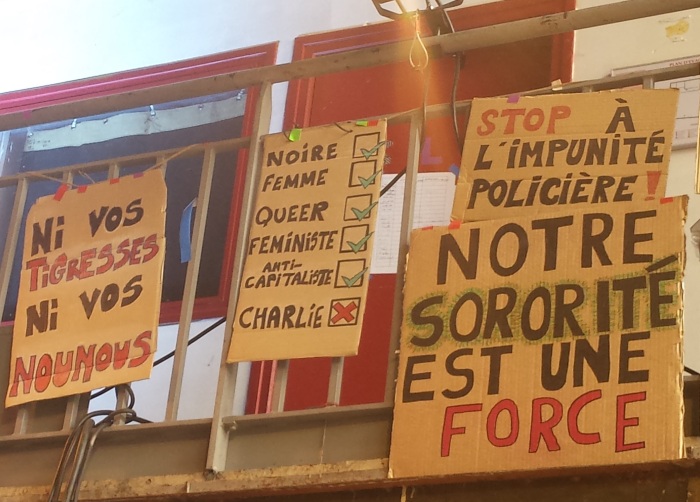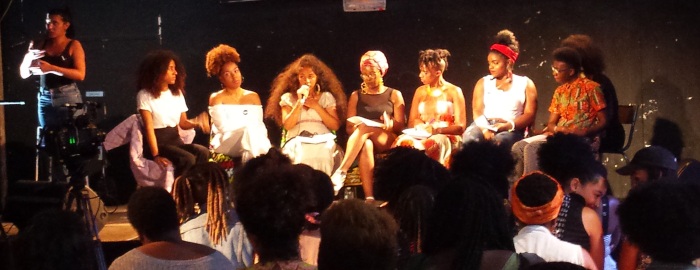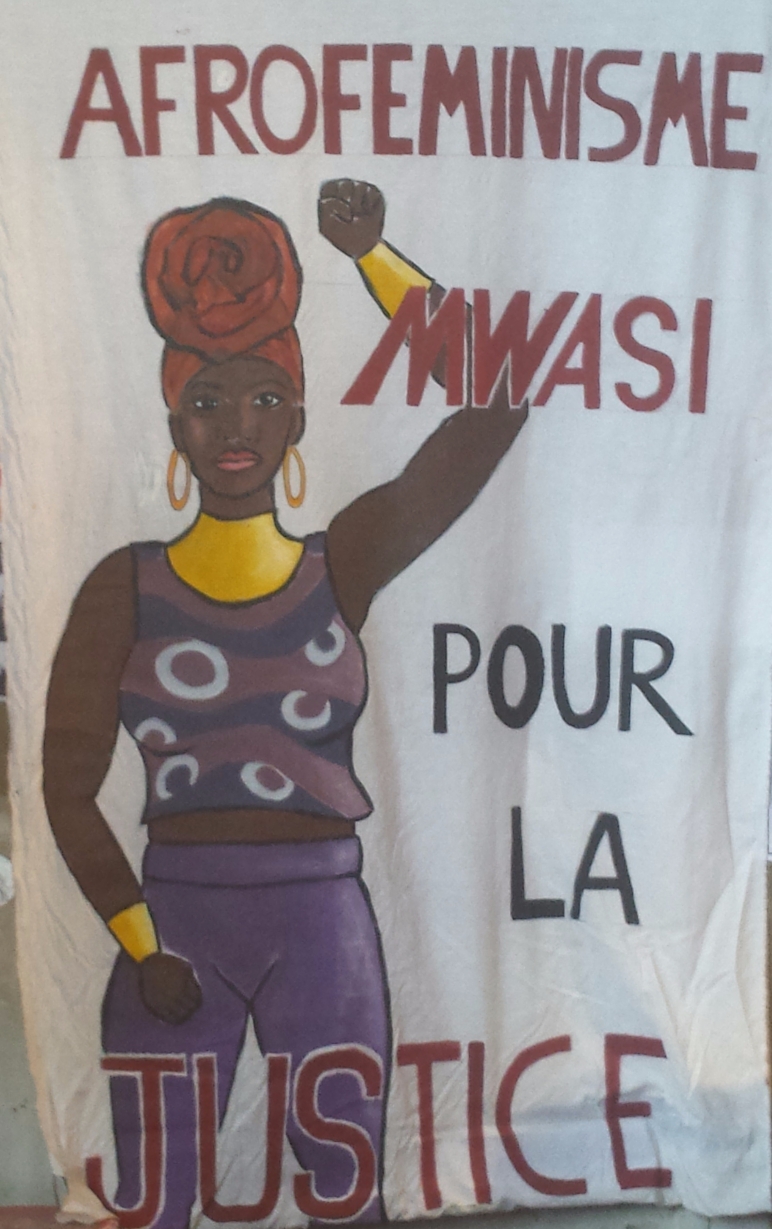I hadn’t been in Paris for quite a while. The last time I visited I was still writing my Master Thesis on African Philosophy. I made quite a few trips back to Paris back then, as I was able to find more books on African Philosophy and postcolonial theory there than in Amsterdam. I could not find these books in Amsterdam, I had to visit the dwellings of the other former master. This one had made more trips and longer stays on the land and fields.
This time it was an Afrofeminist festival that drew me back to the city. The Nyansapo festival organized by Mwasi Collectif, a group of black feminists. The first ever Afrofeminist festival that was to be held in France. The festival caused quite a bit of controversy with the mayor of Paris wanting to shut it down, as word got out that white women were allegedly forbidden to partake in it. The truth was that the festival was open to everyone, it was only the workshops that were to be exclusively for black women to discuss matters that they experience as black women, freely and unapologetically, and they were going to be held at a different location.
Learning about the controversy made me want to go. I have lived in France, and have many relatives who remain there. I know that life ain’t no pick-nick for black people there, relegated to impoverished neighborhoods, faced by police brutality, living on the outskirts of society and being called a ‘bande de racailles’ by politicians for protesting and revolting against their situation. Yet the Mayor would have you believe that these black women are the ones being problematic. I supported them on social media with the #Jesoutiensmwasi hashtag, but thought they would probably need a little more support than that. I decided that I needed to be there, I needed to physically and financially support these women.
Regretfully I couldn’t get there on the opening day of the festival and I apparently missed quite the stir up that day, a journalist from the Russian media outlet RT showed up to the opening, which was open to everyone, with a cameraman and no tickets. They were filming the people entering the festival and tried to get in themselves to film the event. They were denied entry as they had no tickets. The journalist screamed ‘Russophobia’ and accused them of not letting her enter because she works for RT. I have to admit that I am kind of sorry to have missed that.
I arrived in Paris the next morning with only one bag in my hand and Maya Angelou in the other. The city felt different to me now. France has come to mean something different. Despite the history it still had, as having once been to me the place where writers like Maupassant and Gide worked and lived, and where Josephine Baker, James Baldwin and Richard Wright defected to. Now the city seemed stale. It looked straight ahead of itself, but didn’t speak. This city. Cities don’t just change. It was me, I had credited this city for that which had been the works of a few.
I headed to the festival. I was ready to see if I could meet my contemporary few.

On my way there I checked the Facebook page once more for updates. One particular post caught my attention. A young woman had written that she had seen that some workshops were to be exclusively for black women, but she was writing a paper on the political activism of Afro-Colombian women and thus wanted to observe black women organizing themselves politically.
I look up from my phone, I frown and than I smirk thinking ‘Is she for real?’, wanting to not take seriously this request, and yet realizing the very sad reality her requested intrusion illustrates.
I would like to further illustrate the mindset I was in coming into this festival. A few days earlier I had received a message from a fellow philosopher. She had worked on the translation of a book called ‘African philosophy through Ubuntu’ by Ramose. Another philosopher who had done his PhD on African philosophy was writing the introduction, yet another one who is currently writing his PhD on African philosophy was also part of the project. They were now all reading and studying the material again, and she was now as she stated, delving back into the material again. They were planning on getting together for a couple of nights and discussing the book along with a fourth party who has done research on Ubuntu. She found certain points discussed in the book particularly interesting, such as the position of women and how this can be interpreted. She wants me to join and and discuss the book.
I read it again.
I did not know about this project. I have not been involved, apparently no person of African descent was. I am to discuss the book with them after the fact. What is my role? I am to be the only person of African descent present discussing African philosophy with four others who aren’t. These four others are involved with this project. They are actually able to do this for a living. Why do they need me now, why am I invited now?
How peculiar. But where lies the peculiarity? Is it mine? I wouldn’t call my situation common or usual, and it’s definitely not trite. Even though it has already been theorized, written in prose and sang in a blue note, you cannot help but to feel it anew at each time. You sense it and you look back thinking; Peculiar, how peculiar. How their world is so peculiar. It’s trying to grasp something that remains out of reach. But this thing is not a thing.

I arrived at the location where the workshops were to be held. I went to a workshop on intersectionality, on the appropriation of the term to be exact. How do we make sure the term remains a tool for reflection and action? This tool that we’ve developed, how do we keep it a reality? How do we keep it from being depoliticized?
We noted that the term has sadly become a purely academic term, set in frameworks and used as an adjective, by those for whom it is just a concept, who don’t live it. It is being separated from people’s lives, separated from our lives, unless of course they need new study material for research. When they talk about intersectionality, what are they talking about?
This term that is based on our lived experiences, needs to be re-appropriated by life, our lives. Many black women live intersectionality, even when they don’t have the words to express it. What about all these African women, past and present, who live intersectionality without having the words to express this, and those who have lived it when the term wasn’t coined yet?
What about my grandmother who was born and grew up under Belgian colonial rule. Education was not a priority for the Belgian rulers. Education was limited, the only schools available were those set up by catholic missionaries, access to higher education was even more so. My grandfather went to a school led by missionaries, and even worked for them for a while, but than wasn’t allowed to further his education. However my grandmother wasn’t able to attend school altogether as the schools those missionaries set up were only for boys, girls were not allowed to attend. She is not an academic researcher, but her life and those of other women like her have been defined by intersectionality. Don’t erase her struggle and don’t reduce her to an object of study.

It was enriching to be among all these black women who came from across Europe to attend this festival. Many of the stories the women at the festival shared, women from various black cultures, were familiar to me. Such as experiences they had in school, at work and their stories of colorism within their families. Others were less familiar, notably the stories of police brutality against black people in France. These sounded like the stories I heard on the news about racial tensions in the USA. A family member of a victim of police brutality was invited to the festival to talk about and lessons were given on how to deal with and protect yourself when facing the police, and how to protect families who have have been victims of police brutality. How do we relate to the police? Are there other avenues for us to resort to when facing problems within our communities?
And then there were stories I was myself oblivious to. During one of the final workshops one woman broke down in tears thinking about all the Black feminists and Black LGBTQ she knew who are fighting for the black community and never see that effort being reciprocated. They are always at the forefront of black activists movements, but also suffer all the consequences; getting fired and/or not being hireable for being in the system as activists. Besides performing intellectual and emotional labour, their work is also material labour. She told the story of all the Black mothers she knows who have been activists and are now depressed. I never fully considered the price of the efforts of all those who gave a face to my experiences, and how much I am indebted to them.
Ofcourse the festival was also filled with a lot of laughter, a lot of food, spiced and well seasoned, and music. French rapper Casey attended and spoke on her experience in the French music scene, her Black and Caribbean heritage and discussed her music and musical influences. People shared their initiatives and projects. Bonds were created and ideas exchanged. The festival ended with a panel discussion on the perspectives for revolutionary Black Feminism, consisting of women from various Black feminist organizations in the UK, Spain, France, Belgium and Holland. Afterward a little girl went up to several of the women who sat on the panel and asked them about their work and why they’re doing the work they do. She seemed a bit shy and nervous, but ended up hugging them and taking selfies with them as her mother looked on and smiled.
Something happened in Paris. The city gained a new meaning, one that cannot be attributed to names in the past. I left Paris with a new impression of the city, a city populated by these women.

Thank you. Very insightful and touching. It makes me look at the city I love and it’s people from a different perspective.
LikeLike